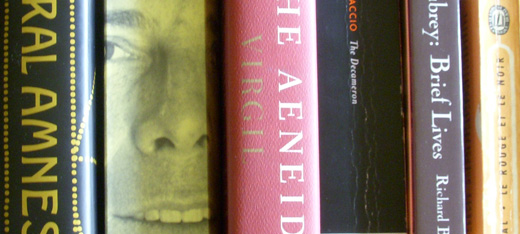Thursday Morning Read
And so I come to the end of the first round of Morning Reads, or almost: I’m done with Aubrey. There are still two stories to read in Nam Le’s The Boat, so perhaps we’ll have one or two more entries headed by the image above, which I decided not to update when I tossed in The Boat a few days ago.
Then what? I know what I’ll be reading in the next round, but not when I’ll begin. I’m inclined to take a break, or to do something different for July and August. I’m also inclined not to think about it, because it is July and will soon be August.
¶ It is wholly typical of Aubrey to write about Christopher Wren without mentioning his career as a London-rebuilding architect. It seems that Aubrey hoped to write a lengthy life of Wren, but didn’t get round to it. Instead, a sheaf of notes, among them this:
It ought never to be forgotten, what our ingenious countryman Sir Christopher Wren proposed to the silk stocking weavers of London, viz a way to weave seven pair or nine pair of stockings at once (it must be an odd number). He demanded four hundred pounds for his invention; but the weavers refused it, because they were poor, and besides, they said it would spoil their trade; perhaps they did not consider the proverb that light gains, with quick returns, make heavy purses. Sir Christopher was so noble, seeing they would not adventure so much money, that he breaks the model of the engine all to pieces, before their faces.
“Noble”? Why didn’t Wren go into the silk-stocking weaving business himself? It would be interesting to know more about this “engine.”
¶ Nam Le’s “Hiroshima” reminds me of those études of Liszt that are too breathtakingly virtuosic to be agreeable to the ear. Narrating in the voice of a third-grader, Mr Le floats a chain of impressions with little regard for linear coherence, which some readers might find interesting but which only annoys me. The discontinuity of scale between the thoughts of a girl who has been evacuated to the countryside and the enormity of the bomb that explodes over and over again before finally detonating in the story’s last line had me wondering what Mr Le’s point might be. Again: why is this a short story and not a novel? Why force the reader through this material so abruptly?
In Merrill, an image that brilliantly characterizes our age of “recovery”:
Patients sharing pain like fudge from home

